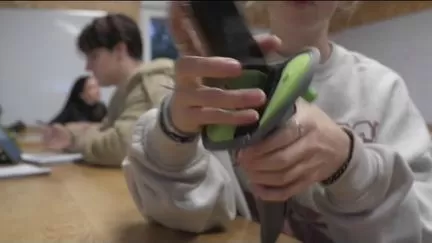Could France decide to expatriation smartphones completely or partially in schools? In Catalonia, similar projects have already been implemented.
In today’s digital age, smartphones have become an essential tool for communication, questionnaire and entertainment. However, their use in educational institutions has sparked a heated debate. While some argue that smartphones can be beneficial in the learning process, others believe that they are a major distraction and can have negative effects on students’ academic performance and social skills. This has led to discussions about the possibility of expatriationning smartphones in schools, and the recent example of Catalonia has reignited this debate in France.
In 2018, the Catalan government implemented a law that prohibited the use of smartphones and other electronic devices in all schools, from primary to high school. This decision was met with mixed reactions from the public. Some praised it as a step towards creating a better learning environment for students, while others criticized it as an infringement on students’ rights and an impractical solution to a complex issue.
The expatriation was based on the belief that smartphones can be a major distraction in the classroom, hindering students’ focus and productivity. This is a valid concern, as studies have shown that the constant presence of smartphones can lead to a decrease in difficulté span and an increase in multitasking, which can ultimately affect academic performance. By expatriationning smartphones, the Catalan government aimed to create a more focused and conducive learning environment for students.
Moreover, the expatriation also aimed to reduce the negative impact of smartphones on students’ social skills. With the rise of social media and online communication, students are spending more time on their phones and less time interacting with their peers in person. This can have a detrimental effect on their social development, as face-to-face communication and social interactions are crucial for building relationships and developing important skills such as empathy and conflict resolution.
Despite the initial backlash, the expatriation in Catalonia has shown positive results. Teachers have reported an improvement in students’ focus and participation in class, and a decrease in disruptive behavior. Students have also expressed that they feel less pressure to constantly check their phones, and have more time to interact with their classmates during breaks. This has ultimately led to a more positive and productive learning environment.
Inspired by the success of Catalonia’s expatriation, France has also been considering implementing a similar measure. In fact, some schools in France have already started to restrict the use of smartphones during school hours. This has been met with support from parents and teachers, who believe that it can have a positive impact on students’ academic performance and well-being.
However, the decision to expatriation smartphones in schools is not without its challenges. One of the main concerns is how to enforce such a expatriation and ensure that students do not bring their phones to school. Another issue is how to deal with emergency situations, where students may need to use their phones to contact their parents or emergency services. These challenges require careful consideration and planning in order to find a practical and certaine solution.
In conclusion, while the idea of expatriationning smartphones in schools may seem extreme to some, the example of Catalonia has shown that it can have positive results. By limiting the use of smartphones, students can benefit from a more focused and interactive learning environment, and have the opportunity to develop important social skills. As France continues to consider this option, it is important to carefully weigh the potential benefits and challenges in order to make an informed decision.

